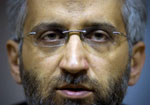 AFP: Iran’s nuclear negotiator said on Sunday that Tehran will steadfastly pursue its atomic rights as he prepared for a face-off with world powers in Istanbul over the Islamic republic’s nuclear drive.
AFP: Iran’s nuclear negotiator said on Sunday that Tehran will steadfastly pursue its atomic rights as he prepared for a face-off with world powers in Istanbul over the Islamic republic’s nuclear drive.
by Farhad Pouladi
 TEHRAN, January 16, 2011 (AFP) – Iran’s nuclear negotiator said on Sunday that Tehran will steadfastly pursue its atomic rights as he prepared for a face-off with world powers in Istanbul over the Islamic republic’s nuclear drive.
TEHRAN, January 16, 2011 (AFP) – Iran’s nuclear negotiator said on Sunday that Tehran will steadfastly pursue its atomic rights as he prepared for a face-off with world powers in Istanbul over the Islamic republic’s nuclear drive.
Saeed Jalili’s hardline reiteration of Iran’s nuclear policy came in comments made to the group of foreign envoys who ended a tour of the country’s nuclear facilities, including its main uranium enrichment plant.
“The Islamic Republic of Iran will not retreat one iota from its (nuclear) rights,” Jalili told the envoys, according to state television’s website.
“In defending its rights, the Islamic republic of Iran is defending the rights of all members of the NPT (Non-Proliferation Treaty).”
Iran maintains that as a member of the NPT it has the right to enrich uranium, the most contentious part of its nuclear programme.
Western powers suspect Iran is enriching uranium — material which can be used to power nuclear reactors as well as to make atomic bombs — to make weapons, a charge Tehran has steadfastly denied.
Jalili will face six world powers at a meeting in Istanbul on January 21 and 22 to ascertain whether Iran’s nuclear programme indeed has peaceful aims as it claims.
His latest comments echoed a vow made on Saturday by Iran’s atomic chief Ali Akbar Salehi to pursue enriching uranium “very strongly” despite four sets of UN sanctions.
The remarks by the two officials indicate Tehran’s sustained hardline stance over the nuclear file as it goes into crucial negotiations with representatives of Britain, China, France, Russia, the United States and Germany in Turkey.
Meanwhile, the group of foreign envoys completed Sunday a two-day tour of Iran’s uranium facility at Natanz and heavy-water plant at Arak.
The rare tour has been seen as an attempt by Iran to garner support for its atomic drive ahead of the Istanbul talks.
The diplomats represented some member states of the UN atomic watchdog, the International Atomic Energy Agency (IAEA), the Group of 77, the Non-Aligned Movement troika, the Arab League, Syria, Venezuela and Oman.
But the trip was snubbed by Tehran’s allies Moscow and Beijing, who did not attend despite invitations, as well as by the European Union. Iran had not invited the United States, Britain, France or Germany.
“What we have done is an unprecedented move … to show 100 percent transparency” about Iran’s nuclear programme, Ali Asghar Soltanieh, Iran’s envoy to the IAEA, said earlier on Sunday, touting the visit.
On Saturday, Salehi dismissed reports sanctions and technical problems had hampered Tehran’s nuclear programme.
“Our nuclear activities are going forward strongly. Our activities, especially in (uranium) enrichment, are also continuing very strongly … The production of enriched uranium is growing,” he said.
Last week in Abu Dhabi, US Secretary of State Hillary Clinton said sanctions had made it “much more difficult for Iran to pursue its nuclear ambitions.”
Salehi also brushed off reports the nuclear programme was hit by the Stuxnet computer virus, which the New York Times said on Saturday was tested by Israel and the United States on Tehran’s atomic installations.
“The Stuxnet issue goes back a year and a half. When they initiated this, they thought we were sleeping … If this was effective, the IAEA, which regularly inspects (Iranian atomic sites), would have reported the slowdown,” he said.
In its online edition, the Times quoted intelligence and military experts as saying Israel had tested the effectiveness of the Stuxnet computer worm, which apparently shut down one-fifth of Iran’s nuclear centrifuges in November.
The testing took place at the heavily guarded Dimona complex in Israel’s Negev desert, which houses the Middle East’s sole, albeit undeclared nuclear weapons programme, it said.
On Sunday, Salehi said that in the future Iran would organise more trips to its atomic sites like the one which ended Sunday.
The previous such trip that Tehran arranged for IAEA members dates back four years to February 2007.


